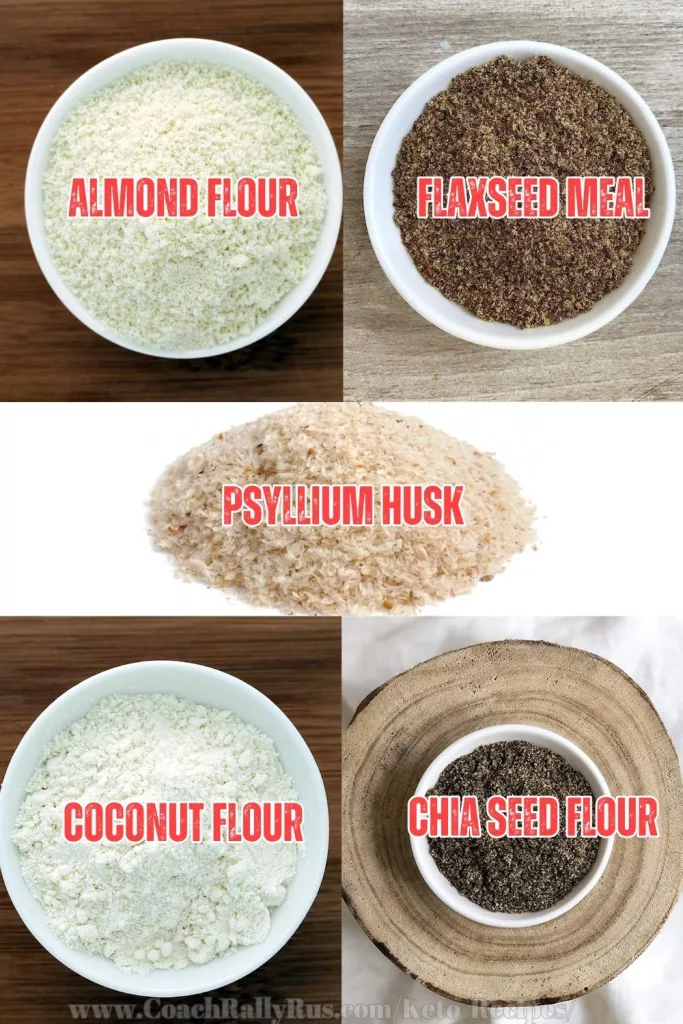Is Coconut Flour Keto? Use Coconut Flour In Keto Recipes
Yes, coconut flour is keto-friendly! It’s a low-carb, high-fiber flour made from the pulp of coconuts. With its low glycemic index and healthy fats, it fits well into a ketogenic diet. Coconut flour is a great alternative to traditional wheat flour, making it perfect for keto baking and cooking.
It’s made from the pulp of coconuts and is packed with fiber and healthy fats.
If you want a quick, printable reference instead of scrolling back and forth, I’ve put all keto-friendly flours into a simple Keto Flours & Baking Swaps Guide with clear categories and easy swaps.
What is Coconut Flour?
Coconut flour is a byproduct of coconut milk production. After extracting the milk, the remaining coconut meat is dried and ground into a fine powder. This flour is grain-free and gluten-free, making it a suitable option for those with celiac disease or nut allergies.
Nutritional Facts of Coconut Flour
Coconut flour is rich in dietary fiber, which helps with digestion and keeps you feeling full longer. It also contains healthy fats, including medium-chain triglycerides (MCTs), which can support weight loss and heart health.
A quarter cup serving of coconut flour typically contains 120 calories (this could very per brand).
Here are some key nutritional facts:
- 6 grams of net carbs: Coconut flour has a low glycemic index, making it a good choice for managing blood sugar levels.
- 10 grams of fiber: High fiber content helps with digestion.
- 3 grams of protein: Provides a moderate amount of protein.
- 4 grams of healthy fats: Contains MCTs and other fatty acids.
Why Is Coconut Flour Keto-Friendly?
Coconut flour is keto-friendly because it has a low carb content and is high in fiber. This makes it a great option for those looking to reduce their carb intake while still enjoying baked goods and other recipes.
Plus, its nutty flavor adds a delicious twist to your favorite foods.
Coconut flour comes from dried coconut meat. It’s popular in the keto diet because of its unique nutritional profile. It has very few carbohydrates and is high in fiber and healthy fats. This makes it perfect for maintaining your keto diet. Its low glycemic index (GI) means it has minimal effect on blood sugar levels. This is another reason why coconut flour is highly valued in a keto diet.
How to Use Coconut Flour in Keto Recipes?
Using coconut flour in keto recipes can be a bit tricky because it absorbs a lot of liquid. Here are some tips for best results:
- Use extra eggs: Coconut flour needs more binding agents, so add extra eggs to your recipes.
- Add more liquid: Since coconut flour absorbs more liquid, you may need to add more water, milk, or coconut oil.
- Combine with other flours: Mixing coconut flour with almond flour or chia flour can improve texture and flavor.
Health Benefits of Coconut Flour
Coconut flour offers several health benefits:
Supports weight loss
Coconut flour is high in fiber, which helps you feel full for longer periods. This can reduce overall calorie intake, making it easier to manage weight.
Heart health
The healthy fats in coconut flour, including medium-chain triglycerides (MCTs), support heart health. These fats can help improve cholesterol levels and reduce the risk of heart disease.
Digestive Health
Coconut flour is rich in dietary fiber, which aids digestion. Fiber helps to regulate bowel movements, prevent constipation, and promote a healthy gut.
Blood sugar control
With its low glycemic index, coconut flour has a minimal impact on blood sugar levels. This makes it a good option for those managing diabetes or looking to maintain stable energy levels.
Nutrient-rich
Coconut flour contains essential nutrients like iron, which is important for oxygen transport in the blood, and potassium, which helps maintain proper muscle and nerve function.
Gluten-free
For those with celiac disease or gluten sensitivity, coconut flour is a great alternative to traditional wheat flour. It allows you to enjoy baked goods without the adverse effects of gluten.
Versatile in recipes
Coconut flour can be used in a variety of keto-friendly recipes, from bread and pancakes to cookies and muffins. Its unique flavor and texture add a delicious twist to your favorite dishes.
By incorporating coconut flour into your diet, you can enjoy these health benefits while sticking to your keto lifestyle.
Coconut Flour vs. Other Flours
Coconut flour stands out from other flours due to its unique nutritional profile and baking properties. Unlike traditional wheat flour, coconut flour is grain-free and gluten-free, making it suitable for those with celiac disease or gluten sensitivities.
It has a lower carbohydrate content and higher fiber content compared to regular flour, which is ideal for a keto diet. Coconut flour also contains healthy fats, including medium-chain triglycerides (MCTs), which support weight loss and heart health.
When compared to almond flour, another popular keto-friendly flour, coconut flour is more absorbent and requires more liquid in recipes. Almond flour has a milder flavor and a coarser texture, while coconut flour has a distinct nutty flavor and a finer texture.
Both flours have their own benefits and can be used in various keto recipes, but they are not directly interchangeable due to their different properties.
More Gluten Free Low Carb Keto Friendly Flour Alternatives:
- The Best Flour Alternatives For Keto Diet | Gluten Free Flours
- Is Almond Flour Keto Friendly? Benefits Keto Recipes Uses & More
- The Best Keto Friendly Nut Free Flour Alternatives For Baking
How do I substitute coconut flour in baking?
Substituting coconut flour in baking requires some adjustments due to its high absorbency and unique texture. Here are some tips to help you get the best results:
Use Less Coconut Flour: Coconut flour is highly absorbent, so you need much less of it compared to other flours. A general rule of thumb is to use 1/4 to 1/3 cup of coconut flour for every cup of regular flour.
Add More Liquid: Because coconut flour absorbs a lot of moisture, you will need to increase the amount of liquid in your recipe. This can be water, milk, or even coconut oil.
Increase the Eggs: Coconut flour requires more binding agents, so you will need to add extra eggs. Typically, you should add one extra egg for every 1/4 cup of coconut flour used.
Combine with Other Flours: To improve texture and flavor, consider mixing coconut flour with other keto-friendly flours like almond flour or chia flour. This can help balance the absorbency and provide a better overall texture.
Use Xanthan Gum: Adding a small amount of xanthan gum can help bind the ingredients together, especially in baked goods. This is particularly useful for recipes like bread and cakes.
By following these tips, you can successfully substitute coconut flour in your keto baking and enjoy delicious, low-carb treats.
Where to Buy Coconut Flour?
Finding coconut flour is easy, whether you prefer shopping online or in-store. Here are some popular options:
- Amazon: Amazon offers a wide variety of coconut flour brands, including organic and bulk options. It’s convenient and often has competitive prices. This is my favorite Coconut Flour Brand on Amazon (click here).
- Walmart: Walmart carries several brands of coconut flour, both in-store and online. Look for options like Great Value Organic Coconut Flour.
- Whole Foods: Whole Foods Market stocks high-quality coconut flour, often in the baking or gluten-free section. They offer organic and specialty brands.
- Trader Joe’s: Trader Joe’s is another great place to find coconut flour. They typically have their own brand, which is known for quality and affordability.
- Kroger: Many Kroger stores have a health food section where you can find coconut flour. Check the baking aisle or the gluten-free section.
Keto Coconut Flour Recipes
Here are some delicious keto coconut flour recipes to try:
- Keto Coconut Flour Mug Bread in 5 Minutes
- Keto Mug Cake with Strawberries and Coconut Flour
- Keto Peanut Butter Mug Cake Recipe With Coconut Flour
- Keto Blueberry Mug Cake With Coconut Flour
- Keto Chocolate Mug Cake With Coconut Flour
- Keto Oreo Mug Cake With Coconut Flour
- Keto Blueberry Muffins with Coconut Flour
Coconut flour is a versatile and keto-friendly flour that can be used in a variety of recipes. Whether you’re making keto bread, pancakes, or other baked goods, coconut flour is a great way to enjoy your favorite foods while staying in ketosis.
It offers numerous health benefits, including supporting weight loss, heart health, and digestive health. Coconut flour is also a good option for those with celiac disease or gluten sensitivities, as it is grain-free and gluten-free.
When substituting coconut flour in baking, remember to use less flour, add more liquid, and increase the number of eggs. Combining it with other keto-friendly flours and using xanthan gum can also improve your results.
You can easily find coconut flour at popular retailers like Amazon, Walmart, Whole Foods, Trader Joe’s, and Kroger, as well as online stores like Thrive Market and Vitacost.
Additional Resources
- Keto Flours & Baking Swaps Guide – A simple, printable breakdown of keto-friendly flours (including almond flour), with clear guidance on when and how to use each one.
- Keto Foods List Guide – A quick yes/no food list you can save or keep handy while shopping.
- Simple Keto Starter Bundle – Everything in one place (foods, vegetables, fruits, flours, plus a starter guide) if you prefer a complete reference.













